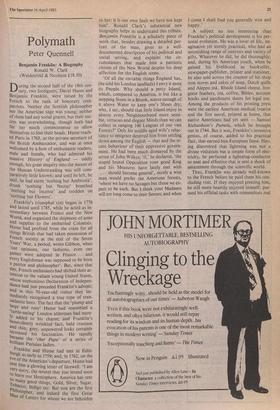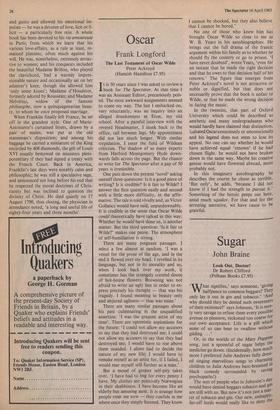Polymath
Peter Quennell
Benjamin Franklin: A Biography Ronald W. Clark (Weidenfeld & Nicolson £18.50) During the second half of the 18th cen- tury, two foreigners, David Hume and Benjamin Franklin, were raised by the French to the rank of honorary com- patriots. Neither the Scottish philosopher nor the American sage was young; neither of them had any social graces; but their suc- cess was overwhelming, though both had far too much commonsense to allow themselves to lose their heads. Hume reach- ed Paris in 1763, as the private secretary of the British Ambassador, and was at once welcomed by a host of enthusiastic readers, male and female, who had admired his massive History of England — oddly enough, his great enquiry into the nature of the Human Understanding was still com- Paratively little known; and until he left, he said, he had eaten 'nothing but Ambrosia', drunk 'nothing but Nectar' breathed 'nothing but Incense' and trodden on 'nothing but Flowers'.
Franklin's triumphal visit began in 1776 and lasted until 1785, while he acted as in- termediary between France and the New World, and organised the shipment of arms and supplies to the embattled Colonists. Hume had profited from the craze for all things British that had taken possession of French society at the end of the Seven Years' War, a period, wrote Gibbon, when 'our opinions, our fashions, even. our games were adopted in France ... and every Englishman was supposed to be born a Patriot and philosopher'. But, since that day, French enthusiasts had shifted their at- tention to the valiant young United States, Whose euphonious Declaration of Indepen- dance had just preceded Franklin's advent; and in this 70-year-old visitor they im- mediately recognised a true type of tran- satlantic hero. The fact that the 'plump and large and rosy' Hume had resembled a 'turtle-eating London alderman had mere- IY added to his charm; and Franklin's benevolently wrinkled face, bald cranium and thin, grey, unpowered locks certainly !nereased his fascination. He rapidly became the 'cher Papa' of a series of brilliant Parisian ladies.
Franklin and Hume had met in Edin- burgh as early as 1759; and, in 1762, on the eve of the American's departure, Hume had svent him a glowing letter of farewell. 'I am erY sorry, (he wrote) that you intend soon rut) leave our Hemisphere. America has sent _s many good things, Gold, Silver, Sugar, jobacco, Indigo etc. But you are the first 1,11110sopher, and indeed the first Great Man of Letters for whom we are beholden to her: it is our own fault we have not kept him". Ronald Clark's substantial new biography helps us understand this tribute. Benjamin Franklin is a scholarly piece of work that, besides drawing a detailed por- trait of the man, gives us a well- documented description of his political and social .setting, and explains the cir- cumstances that made him a patriotic citizen of the New World despite his deep affection for the English scene.
'Of all the enviable things England has, (he told his London landlady) I envy it most its People. Why should a petty Island, which, compared to America, is but like a stepping Stone in a Brook, scarce enough of it above Water to keep one's Shoes dry; why, I say, should that little Island enjoy in almost every Neighbourhood more sensi- ble, virtuous and elegant Minds than we can collect in ranging 100 Leagues of our vast Forests?' Only his middle aged wife's reluc- tance to emigrate deterred him from settling down among the English — that and the re- cent behaviour of their oppressive govern- ment. He had been much dismayed by the arrest of John Wilkes; `if,' he declared, 'the stupid brutal Opposition your good King and his Measures have lately met with ... should become general', surely a wise man would prefer the American forests, 'where we have no Savages but those we ex- pect to be such. But I think your Madmen will ere long come to their Senses; and when
I come I shall find you generally wise and happy.'
A subject no less interesting than Franklin's political development is his per- sonal evolution. He was a lover of life, im- aginative yet sternly practical, who had an astonishing range of interests and variety of gifts. Whatever he did, he did thoroughly; and, during his American youth, when he gained his livelihood as bookseller, newspaper-publisher, printer and stationer, he also sold across the counter of his shop iron stoves and cakes of soap, Dutch quills and Aleppo ink, Rhode Island cheese, live- geese feathers, tea, coffee, Bibles, account books and parchment sheets for legal use. Among the products of his printing press were the earliest American medical treatise and the first novel, printed at home, that native Americans had yet seen — Samuel Richardson's Pamela, which he brought out in 1744. But it was, Franklin's inventive genius, of course, added to his practical flair, that earned him European fame. Hav- ing discovered that lightning was not a divine visitation but a simple form of elec- tricity, he perfected a lightning-conductor so neat and effective that ie sent a shock of amazement through the scientific world.
Thus, Franklin was already well-known to the French before he paid them his con- cluding visit. If they enjoyed greeting him, he still more heartily enjoyed himself, pur- sued his official tasks with tremendous zeal
and gusto and allowed his emotional im- pulses — he was a devotee of love, licit or il- licit — a particularly free rein. A whole book has been devoted to his vie amoureuse in Paris; from which we learn that his various love-affairs, as a rule at least, re- mained platonic, often much against his will. He was, nonetheless, extremely attrac- tive to women; and his conquests included the beautiful Madame Britton, who played the clavichord, had a warmly impres- sionable nature and occasionally sat on her admirer's knee, though she allowed him 'only some kisses'; Madame d'Houdetot, formerly adored by Rousseau; and Madame Helvetius, widow of the famous philosophe, now a quinquagenarian beau- ty, to whom he once proposed marriage.
When Franklin finally left France, he set off in the grandest style. One of Marie- Antoinette's curtained litters, drawn by a pair of mules, was put at the old statesman's disposition; and among his baggage he carried a miniature of the King encircled by 408 diamonds, the gift of Louis XVI usually bestowed on ministers pleni- potentiary if they had signed a treaty with the French Court. Back in America, Franklin's last days were notably calm and philosophic; he was still a speculative sage, and announced not long before his end that he respected the moral doctrines of Chris- tianity but was inclined to question the divinity of Christ. He died quietly on 17 August 1790, thus closing, the physician in attendance noted, 'a long and useful life of eighty-four years and three months'.











































 Previous page
Previous page